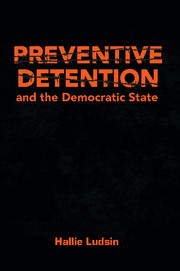Book contents
- Frontmatter
- Contents
- Acknowledgements
- List of Acronyms and Abbreviations
- Introduction
- 1 The Theoretical Framework
- 2 The Policy Debates
- 3 Preventive Detention under International Law
- 4 The History of Preventive Detention in India
- 5 India's Current Preventive Detention Legislation
- 6 India: Preventive Detention and Due Process
- 7 India: The Risk Society and the Slippery Slope
- 8 Preventive Detention in England
- 9 England: Preventive Detention and Due Process
- 10 Preventive Detention in the United States
- 11 The United States: Preventive Detention and Procedural Due Process
- 12 Preventive Detention's Slippery Slope
- 13 Preventive Detention and Liberal Democracy
- Index
5 - India's Current Preventive Detention Legislation
Published online by Cambridge University Press: 05 March 2016
- Frontmatter
- Contents
- Acknowledgements
- List of Acronyms and Abbreviations
- Introduction
- 1 The Theoretical Framework
- 2 The Policy Debates
- 3 Preventive Detention under International Law
- 4 The History of Preventive Detention in India
- 5 India's Current Preventive Detention Legislation
- 6 India: Preventive Detention and Due Process
- 7 India: The Risk Society and the Slippery Slope
- 8 Preventive Detention in England
- 9 England: Preventive Detention and Due Process
- 10 Preventive Detention in the United States
- 11 The United States: Preventive Detention and Procedural Due Process
- 12 Preventive Detention's Slippery Slope
- 13 Preventive Detention and Liberal Democracy
- Index
Summary
Despite the Emergency-era abuses of preventive detention, India could not envision governing without access to this power. Rather, parliament sought to limit detention through a constitutional amendment, limitations the government has thwarted. India managed without a general preventive detention law – one that allowed detention on all grounds permitted by the Constitution – only for a two-year period. Since then, it not only adopted a law nearly identical to the Maintenance of Internal Security Act (MISA) but passed additional detention legislation targeting specific crimes. India currently has four permanent, national detention laws – the Conservation of Foreign Exchange and Prevention of Smuggling Act (COFEPOSA), the Prevention of Black Marketing and Maintenance of Supplies of Essential Commodities Act, the National Security Act and the Prevention of Illicit Traffic in Narcotic Drugs and Psychotropic Substances Act. COFEPOSA is the only legislation that predates the emergency, and Parliament never considered revoking it even as it reviled detention under MISA. The government enacted each piece of legislation using the traditional justifications for a state of exception although the Constitution allows detention absent an emergency. It seemed to be trying to give the impression that detention is an extraordinary measure even though the Constitution, with the help of judicial interpretation, allows it to be used in ordinary criminal situations, a point picked up in the next chapter. Over the course of its nearly 70-year history, India has transformed preventive detention from a colonial, despotic measure for control to a necessary evil in an emergency to an ordinary law enforcement tool.
Most of this chapter describes the debates around each of the four current preventive detention laws. These debates highlight the continuity in the government's claim of a state of exception even as its democracy has matured and its security stabilized. They identify who India considers to be its deviant others and, thus, less deserving of rights. They also establish the core beliefs that led India to the bottom of preventive detention's slippery slope – beliefs that later chapters show are not necessarily unique to India.
Current legislation
Conservation of Foreign Exchange and Prevention of Smuggling Activities Act, 1974
The early 1970s saw a marked decline in India's economy that, by 1972–73, led to serious public discontent: “Economic recession, unemployment, price rise and scarcity of goods led to large-scale industrial unrest and a wave of strikes.”
- Type
- Chapter
- Information
- Preventive Detention and the Democratic State , pp. 121 - 153Publisher: Cambridge University PressPrint publication year: 2016



